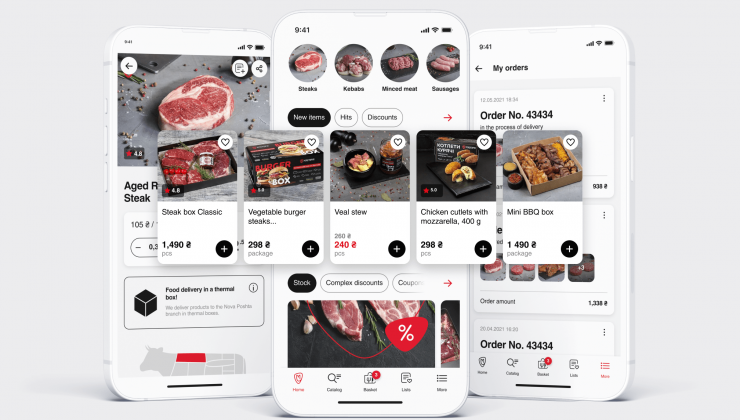Deciding whether it is better to create your own website or use Shopify can significantly impact the success of your e-commerce business. This multifunctional trading platform offers a quick and straightforward way to launch an online store with ready-made templates, making it ideal for small businesses and startups. But an e-commerce platform provides extensive customization options, which is crucial for companies aiming for unique functionality and design which supports scaling and long-term growth.
Over the years, we have specialized in developing bespoke websites that meet every client's specific needs, enhancing your business's potential in the digital marketplace. Therefore, today, together with our partner Turum-burum, UX/UI and CRO agency, we will help you determine the optimal development option.
Shopify vs Own Website: Key Differences
The key differences between Shopify vs own website are based on approaches to developing and then managing web resources. This platform is a cloud service that provides users with complete template solutions that allow them to launch quickly enough and effectively manage online stores without additional deep technical knowledge. This option is most suitable for those who care about simplicity and speed and who prefer to work within well-defined parameters without the goal of deep customization.
The chart clearly illustrates significant growth within the ecommerce vs Shopify landscape, establishing it as a key entity in the ecommerce platform sector. For example, the steep growth until 2021 suggests that this platform greatly expanded its market presence and investor confidence peaked during these years.

Conversely, custom development begins from the ground up, with the sites hosted on independent servers. This grants businesses complete control over every aspect of their web presence, including functionality, design, and security. This method ensures the implementation of unique design and technical solutions.
It's time for a Case Study!
You can go even further and create your own e-commerce application for your business. For example, we implemented such a concept for the Ukrainian restaurant chain called Miastoriia.
In particular, a couple of years ago, this well-known Ukrainian brand of grocery stores and restaurants, offering their customers meat and farm products of the highest quality, approached us for a custom mobile development.
After discussing the project details with the client, we were assigned to combine the functionality of classic e-commerce (for delivery of semi-finished products from a catalog) and an online restaurant in one cross-platform mobile product, giving users the opportunity to place an order in just two clicks. Additionally, we also needed to ensure synchronization of the ready-made solution with third-party accounting software, which the company had been using for a long time.
By choosing Flutter, GraphQL, Oauth2, and Firebase as the main technology stack, in just a few months, we prepared for release a recognizable and brand-inspired mobile application for e-commerce. We've also enriched it with a scalable architecture to make its future updates and optimizations as resource efficient as possible.
As a result, some time after the launch, the client achieved 110% growth in net promoter score and 70% growth in repeat customer rate.
You can find more information about this case here:
Custom Website vs Shopify: Ease to build a website
Shopify and custom websites each cater to distinct needs with their unique advantages. For small businesses or those new to e-commerce, Shopify is an ideal choice, enabling quick site deployment without extensive technical expertise. The platform's user-friendly tools and adaptable templates simplify the online business initiation process, making it accessible to novices.
Conversely, crafting a custom website demands more intricate effort and a deeper understanding of web development. Though this route might appear more daunting and expensive, it rewards you with a website perfectly tailored to the specific demands of your business.
Custom websites excel in offering:
- Enhanced flexibility for integrating essential functionalities,
- Tailored optimization for distinct operational processes,
- A bespoke user experience that stands out.
Shopify vs Own Website Design
No one will argue that the design of a website significantly influences how a brand is perceived and the overall user experience.

In this regard, Shopify vs own website presents distinct options.
- Custom e-commerce platform offer the ultimate design flexibility, starting from scratch with unique layouts crafted in design tools like Figma. These layouts are then customized to meet the specific requirements of a business, allowing for the incorporation of unique design features that highlight the brand’s distinctiveness and set it apart visually from competitors.
- Conversely, Shopify provides a selection of basic templates that users can personalize. While these templates allow for some customization, they are inherently limited and do not offer the same creative freedom as a turn-key site.
Designing a custom website is the most beneficial and practical approach for those who prioritize total control over their site’s visual and navigational aspects. However, if the speed and convenience of using ready-made templates meet your needs, Shopify offers an efficient alternative.
Time to Build Custom eCommerce Website vs Shopify
Development time is critical when deciding between using Shopify or building your own website. Shopify enables rapid website launches with pre-designed themes, ideal for small businesses or entrepreneurs eager to enter the market quickly. Users can select a basic theme and tailor it within hours or a few days, appealing to those prioritizing speed and ease. Subsequent efforts typically focus on populating the website with products.
On the other hand, a custom website offers a unique and tailored experience that can't be replicated. While it does require more time due to thorough planning, designing, developing, and testing, the end result is a website that truly reflects the client's brand and goals. The custom development process, which could take weeks to months, allows for the integration of specific functionalities and site optimization for user needs and search engines, resulting in a superior final product that stands out from the crowd.
Which is better for SEO?
In the modern market, SEO optimization greatly influences the further success of online businesses in almost any niche. Shopify provides users with a fundamental set of tools for SEO optimization (fixing meta tags, automatically creating a site map, optimizing the URL). However, deep SEO optimization is unavailable (users are limited in choosing and modifying the URL structure. As a result, I only sometimes have the opportunity to fully control the HTML/CSS of my sites, which is extremely necessary for specific SEO tactics).
Custom sites provide maximum control over each SEO aspect (deep optimization of the site structure, customization of URLs, page loading speed, and using a unique meta-description for each page). This level of detail ensures precise site settings for the requirements of search engines and the target audience, improving organic visibility and attracting more targeted traffic.
Who has a higher Conversion Rate?
Conversion efficiency is one of the critical indicators of online business success. Shopify has many already built-in tools and an optimized user interface, making it a very effective solution for startups. After all, the platform provides a wide range of professionally designed themes optimized for conversions. This allows businesses to quickly launch a site with a rather visually attractive, albeit simple, design and good user interaction, further facilitating higher conversions.
By the way, Best Shopify Stores list in 2024:
- Hiut Denim Co.
- Tentree
- Maguire Shoes
- The Outrage
- Adored Vintage
Yet, as businesses scale and the need for more specific functionality or unique design elements arises, custom sites emerge as a more empowering choice. Individual development allows for a flexible approach to creating user experience, enabling fine-tuning each site element to maximize conversion rates.
With custom sites, you can integrate advanced analytical tools, test various page versions, and respond more effectively to your target audience's demands. It's important to note that custom sites also offer the opportunity to optimize order processing processes, further enhancing your business's potential for growth. For these reasons, even though Shopify can provide high conversion efficiency in the initial stages, custom sites are ultimately still the best choice for businesses in the future.

Security of using Shopify vs Your Own Website
The security of online platforms is a critical component of customer data protection and a guarantee of stable operation of the entire business.
Shopify, a reliable cloud platform, offers a robust level of security. Its comprehensive security package includes the following:
- Regular security updates.
- SSL certificate-based data encryption.
- Constant protection against DDoS attacks.
- PCI DSS compliance for payment card processing.
While essential, these measures provide a solid business foundation and offer a sense of peace regarding data protection. However, it's important to note that these security measures do come with some limitations on customization for platform users.
Conversely, building your website grants enhanced control over its security features. As the owner, you can implement advanced security software, tailor firewall configurations, and personally oversee the security protocols for each service. Such autonomy enables you to apply additional security measures, including sophisticated authentication procedures and robust data encryption. This advantage is precious for businesses processing many transactions rapidly, placing the control of security measures directly in your hands.
Overall, Shopify can guarantee some essential protection, but the custom site provides advantages over more detailed controls and better security settings in response to specific threats and unique business needs.
Customer Support of Custom eCommerce vs Shopify
Shopify boasts adequate user support and is available 24/7 via email, phone, and online chats. One of Shopify's leading advantages lies in its large community of developers and users, between whom there is a constant exchange of knowledge and solutions through social networks and forums.
It is worth noting that custom sites usually provide more specialized support (for example, personalized service from a team of developers who are familiar in detail with the individual aspects of the site). This lets you quickly respond to problems and make the necessary settings or updates. However, an essential factor is that the level of quality and availability of support directly depends on the choice of the company's service provider or internal resources.
Shopify vs Owned Website Building Cost
Considering the cost aspect of creating a website, it is necessary to be aware of the difference between initial and long-term costs and, at the same time, to assess the possible costs of further expansion and modification. Shopify offers several tariff plans (from basic to more advanced). The initial cost of launching a site on Shopify is relatively low since you use ready-made templates and do not need significant investments in individual development. However, the appearance of additional costs can not be avoided if there is a need for specialized plugins or integrations (for an extra fee). Premium plans and subscriptions for professional services have not been canceled.
The custom site undoubtedly requires a much more significant initial investment. Individual development (design, frontend and backend, server setup and testing) entails several voluminous costs. However, the result of these financial costs will be higher in the long term.
Let's Summarize
|
Criterion |
Shopify |
Custom Website |
|
Initial Costs |
Low, based on subscription |
Depends on the complexity of the project |
|
Development Time |
Quick launch |
Lengthy development process |
|
Functional Capabilities |
Standard tools, limited customization |
Full customization, capability to integrate complex systems |
|
Design |
Limited by templates |
Complete design freedom |
|
SEO |
Basic SEO capabilities |
Full control and SEO optimization |
|
Security |
Standard security, depends on the platform |
Individual security, possibility to use specialized solutions |
|
Support |
24/7 support and large community |
Specialized support, potentially high costs |
|
Scalability |
May be limited |
High scalability |
|
Maintenance Costs |
Constant subscription fee |
Expenses for upkeep and upgrades |
Which One Is Better for You?
The decision to choose between Shopify vs your own website largely hinges on your business's unique requirements, size, and growth phase. Shopify provides an ideal solution for startups and small enterprises seeking a fast market entry on a limited budget. In contrast, a custom website is far superior for medium-sized businesses experiencing growth and requiring specialized functionalities or a unique site that mirrors their brand and user preferences.
For large corporations or businesses in specialized sectors needing extensive customization and control, a custom website far exceeds what Shopify offers. Your choice between Shopify vs own website should also reflect your long-term business strategies, considering immediate expenses, future growth potential, and support needs. Opting for a platform that aligns with these strategic objectives is crucial for ensuring sustained business growth.
If you still doubt the correctness of your choice, you can contact the WEZOM team for advice. You can also delegate your web development project to us to implement unique solutions that reflect your brand and user preferences.



